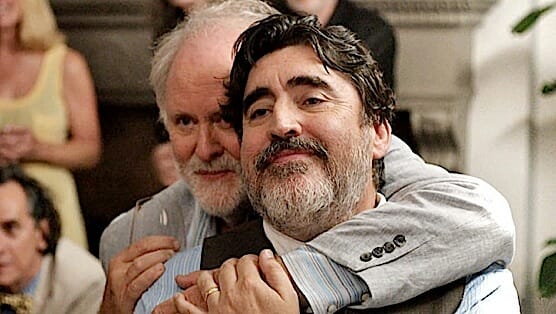In Love Is Strange, Ira Sachs has bucked the trend of American independent filmmaking and crafted an exceptionally thoughtful, elegiac nocturne of a film. It’s romantic without being cloying, it’s sad without being maudlin, it’s funny without winking at the audience, and above all, it’s real. Not a note feels inauthentic. Even the New York City apartments are real!
Ben (John Lithgow) and George (Alfred Molina) are a pair of New Yorkers who are a) in love, b) of a certain age and c) gay. One of these things used to make people gasp when combined with one of the other two. That was the dark ages of say, 2012. Now, notsomuch. The pair have been together for 39 years and due to the legalization of same sex marriage in New York State, are finally preparing to marry.
The beginning of their married life is pretty much as joyous as one could expect. Friends and relatives gather for a lovely outdoor New York City ceremony and return to the couple’s home for a lovely party of piano sing-alongs, toasts, stories, and bon mots. However one cannot help but notice a slight sense of melancholy creeping into the proceedings. If they got this far and are still together, the film seems to ask, why tempt fate by getting married?
Why, indeed? Well, love, for one. One can decry marriage as an archaic institution—and there will always be those who do, often and loudly—but for many people it’s still the ultimate example of confirming and publicly declaring one’s love for one’s partner. And, not to get too unromantic, there are plenty of legal reasons to get hitched (wills, hospital visitations, etc.).
On the other hand, 39 years is a pretty great run and those who fear that getting married might just upset the applecart are pretty much on the mark. Shortly after tying the knot, George is let go from his job teaching music at a Catholic school. While the school knew he was gay, apparently getting married was a bit too public for their liking, and the Bishop was not amused. Faced with a drastic drop in income, George and Ben are forced to sell their apartment and temporarily (and separately) move in with relatives and friends.
George lands on the couch of Ted (Cheyenne Jackson) and Roberto (Manny Perez), a younger gay policemen couple who are not accustomed to have a sexagenarian on their sofa and are reluctant to modify their lifestyle, which seems to consist of almost constant house parties (including an hysterical and raucous Dungeons & Dragons session), while Ben moves in with the family of his nephew Elliot. This latter arrangement seems, at first, to be the better of the two, but as Ben soon remarks, “Sometimes when you live with people, you know them better than you care to.”
This works both ways, as Elliot (Darren Burrows), his wife Kate (Marissa Tomei), and teen-aged son Joey (Charlie Tahan) quickly come to realize. As Ben doesn’t work outside of the home very often, he’s increasingly under foot, which is especially irritating to writer Kate who is used to her solitude during the day. Meanwhile, being a teenager’s hard enough without having to share a room (and a bunk bed) with your great uncle.
As the tensions rise, so does the sorrow. No one likes to see these two wonderful people who are so in love spend so much time apart, and yet no one has a real solution. Ben and George are set in their ways, and the fact is, society is not really equipped to deal with these kinds of situations, especially not in a real estate market like New York City.
The structure of the film, while linear, is non-standard. The film is comprised of vignettes of a sort, with unspecified leaps in time from scene to scene that eventually make it clear that this “temporary” separation is lasting significantly longer than anyone anticipated. Visits to the various NYC housing agencies turn up nothing, and so the forced separation continues, with only the odd date night giving the newlyweds some time together. When George unexpectedly shows up on Elliot’s doorstep and breaks down weeping, we’re fully immersed into their sorrow. It’s a devastating point in a film with more than its share of emotionally affecting moments.
Among other things, Love Is Strange is a love letter to New York. As much so as Adam Leon’s equally wonderful 2013 film Gimme the Loot (albeit in a significantly different part of town), and Sachs uses the city as a character at least as well as Woody Allen at his height and in a much more comfortably multi-cultural and multi-economic way.
From the opening moments in a small apartment with super narrow hallways and a kitchen fit for one cook and one cook only, to the next where George and Ben try to catch a cab to their wedding (“Maybe we’ll have better luck on 6th”) and straight through to the last two scenes, New York City and its wonderful late summer/early autumn light is front and center.
So many films are made up of wonderful scenes with an end result that doesn’t really add up to a compelling whole. Love Is Strange pulls off this tricky task with aplomb. It is full of breath-taking beauty, both visual and thematic, and the score, largely comprised of Chopin, is the perfect accompaniment. The penultimate scene just may be the most affecting you’ll see this year. Lithgow and Molina give two extraordinary performances, and Sachs directs them with painterly skill. This one sticks with you.
Director: Ira Sachs
Writer: Ira Sachs, Mauricio Zacharias
Starring: John Lithgow, Alfred Molina, Marisa Tomei, Darren Burrows, Charlie Tahan, Cheyenne Jackson
Release Date: Aug. 22, 2014 (limited)
